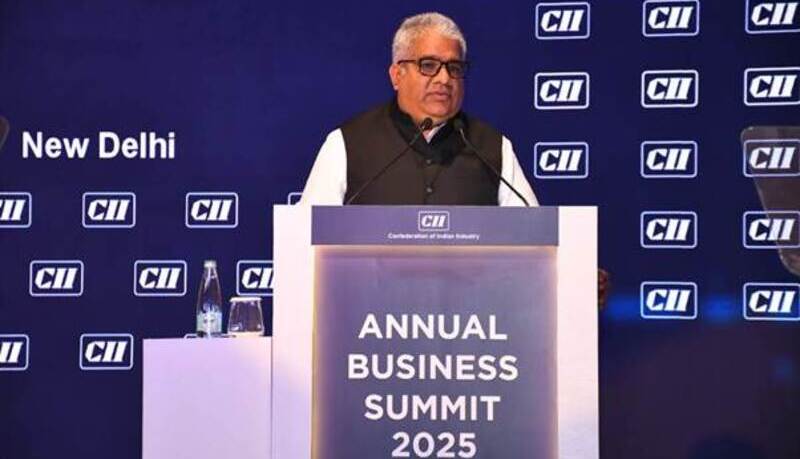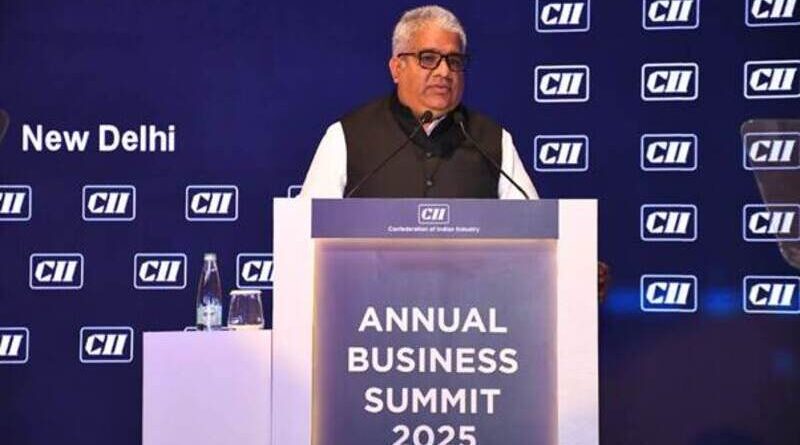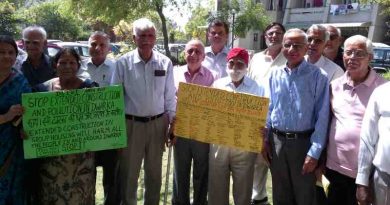Union Minister Bhupender Yadav Outlines India’s Climate Policy Architecture at CII Summit 2025

Union Minister Bhupender Yadav Outlines India’s Climate Policy Architecture at CII Summit 2025
Minister Yadav characterized the ‘India Story’ as a unique blend of tradition and transformation.
By RMN News Service
New Delhi – Union Minister for Environment, Forest and Climate Change, Bhupender Yadav, addressed the Confederation of Indian Industry (CII) Annual Business Summit 2025 on May 29. Speaking on the theme ‘Building Trust – India First’ in a special plenary session titled ‘India’s Climate Policy Architecture: Pathways for Emerging Economies’, Minister Yadav detailed India’s strategic approach to climate action and sustainable development.
Minister Yadav characterized the ‘India Story’ as a unique blend of tradition and transformation, where democracy and development progress together, and compassion coexists with assertiveness. He emphasized that the core of the India Story is always prioritizing India First.
Highlighting the government’s commitment under the leadership of Prime Minister Narendra Modi, the Minister praised initiatives like Mission LiFE (Lifestyle for Environment), which he described as transforming environmental protection into a participative process. Mission LiFE encourages collective contributions from communities, businesses, and individuals towards saving the planet.
Minister Yadav outlined India’s climate policy architecture through three key drivers:
1. Self-Reliant Circular Economy: A Path to Sustainable Growth: India is actively transitioning from a linear to a circular economy model with the goal of reducing waste and improving resource efficiency. The government has implemented Extended Producer Responsibility (EPR) guidelines across various sectors, including tyres, batteries, plastics, and e-waste, to promote recycling and sustainable consumption.
This transition has seen significant industry commitment, with the recycling sector attracting investments totalling ₹10,000 crore between 2022 and 2024. The circular economy sector is projected to be a $2 trillion market by 2050, expected to create approximately 10 million jobs.
Minister Yadav urged industry leaders to actively participate in building this self-reliant circular economy and invited them to join the Resource Efficiency and Circular Economy Industry Coalition, launched under India’s G20 Presidency, as a platform for collaboration and knowledge-sharing.
2. Protecting Natural Ecosystems and Strengthening Resilience: Building on initiatives under Prime Minister Narendra Modi’s leadership, India is focused on conserving its natural environment. Key efforts include Mission LiFE (Lifestyle for Environment) and the nationwide campaign ‘Ek Ped Maa Ke Naam’, a community-driven initiative for environmental conservation. The introduction of Green Credit Rules under Mission LiFE is designed to incentivize voluntary actions towards environmental preservation, fostering a culture of sustainability.
3. Promoting Adaptation: Building Climate Resilience: Acknowledging the challenges presented by climate change, India is dedicated to enhancing resilience through adaptation strategies. The government has released the Draft Framework of the Climate Finance Taxonomy, which provides methodologies for classifying adaptation and mitigation activities.
Furthermore, the first National Adaptation Plan is being developed for submission to the United Nations Framework Convention on Climate Change (UNFCCC). This plan focuses on improving adaptive capacity, strengthening knowledge systems, and reducing exposure to climate risks.
In a world marked by geopolitical uncertainties, Yadav asserted that India remains the most trusted partner globally. He attributed this trust to India’s political stability, visionary leadership, cultural values, and unwavering commitment to a sustainable future.
💛 Support Independent Journalism
If you find RMN News useful, please consider supporting us.




